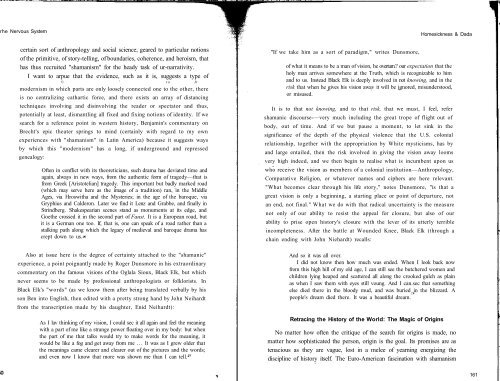The Nervous System - Department of English and Comparative ...
The Nervous System - Department of English and Comparative ...
The Nervous System - Department of English and Comparative ...
Create successful ePaper yourself
Turn your PDF publications into a flip-book with our unique Google optimized e-Paper software.
he <strong>Nervous</strong> <strong>System</strong><br />
Homesickness & Dada<br />
certain sort <strong>of</strong> anthropology <strong>and</strong> social science, geared to particular notions<br />
<strong>of</strong> the primitive, <strong>of</strong> story-telling, <strong>of</strong> boundaries, coherence, <strong>and</strong> heroism, that<br />
has thus recruited "shamanism" for the heady task <strong>of</strong> ur-narrativity.<br />
I want to arpue that the evidence, such as it is, suggests a type <strong>of</strong><br />
© ' to Jr<br />
modernism in which parts are only loosely connected one to the other, there<br />
is no centralizing cathartic force, <strong>and</strong> there exists an array <strong>of</strong> distancing<br />
techniques involving <strong>and</strong> disinvolving the reader or spectator <strong>and</strong> thus,<br />
potentially at least, dismantling all fixed <strong>and</strong> fixing notions <strong>of</strong> identity. If we<br />
search for a reference point in western history, Benjamin's commentary on<br />
Brecht's epic theater springs to mind (certainly with regard to my own<br />
experiences with "shamanism" in Latin America) because it suggests ways<br />
by which this "modernism" has a long, if underground <strong>and</strong> repressed<br />
genealogy:<br />
Often in conflict with its theoreticians, such drama has deviated time <strong>and</strong><br />
again, always in new ways, from the authentic form <strong>of</strong> tragedy—that is<br />
from Greek [Aristotelian] tragedy. This important but badly marked road<br />
(which may serve here as the image <strong>of</strong> a tradition) ran, in the Middle<br />
Ages, via Hroswitha <strong>and</strong> the Mysteries; in the age <strong>of</strong> the baroque, via<br />
Gryphius <strong>and</strong> Calderon. Later we find it Lenz <strong>and</strong> Grabbe, <strong>and</strong> finally in<br />
Strindberg. Shakespearian scenes st<strong>and</strong> as monuments at its edge, <strong>and</strong><br />
Goethe crossed it in the second part <strong>of</strong> Faust. It is a European road, but<br />
it is a German one too. If, that is, one can speak <strong>of</strong> a road rather than a<br />
stalking path along which the legacy <strong>of</strong> medieval <strong>and</strong> baroque drama has<br />
crept down to us.<br />
"If we take him as a sort <strong>of</strong> paradigm," writes Dunsmore,<br />
<strong>of</strong> what it means to be a man <strong>of</strong> vision, he overturn.? our expectation that the<br />
holy man arrives somewhere at the Truth, which is recognizable to him<br />
<strong>and</strong> to us. Instead Black Elk is deeply involved in not knowing, <strong>and</strong> in the<br />
risk that when he gives his vision awav it will be ignored, misunderstood,<br />
or misused.<br />
It is to that not knowing, <strong>and</strong> to that risk, that we must, I feel, refer<br />
shamanic discourse-—very much including the great trope <strong>of</strong> flight out <strong>of</strong><br />
body, out <strong>of</strong> time. And if we but pause a moment, to let sink in the<br />
significance <strong>of</strong> the depth <strong>of</strong> the physical violence that the U.S. colonial<br />
relationship, together with the appropriation by White mysticisms, has by<br />
<strong>and</strong> large entailed, then the risk involved in giving the vision away looms<br />
very high indeed, <strong>and</strong> we then begin to realise what is incumbent upon us<br />
who receive the vision as members <strong>of</strong> a colonial institution—Anthropology,<br />
<strong>Comparative</strong> Religion, or whatever names <strong>and</strong> ciphers are here relevant.<br />
"What becomes clear through his life story," notes Dunsmore, "is that a<br />
great vision is only a beginning, a starting place or point <strong>of</strong> departure, not<br />
an end, not final." What we do with that radical uncertainty is the measure<br />
not only <strong>of</strong> our ability to resist the appeal for closure, but also <strong>of</strong> our<br />
ability to prise open history's closure with the lever <strong>of</strong> its utterly terrible<br />
incompleteness. After the battle at Wounded Knee, Black Elk (through a<br />
chain ending with John Niehardt) recalls:<br />
Also at issue here is the degree <strong>of</strong> certainty attached to the "shamanic"<br />
experience, a point poignantly made by Roger Dunsmore in his extraordinary<br />
commentary on the famous visions <strong>of</strong> the Oglala Sioux, Black Elk, but which<br />
never seems to be made by pr<strong>of</strong>essional anthropologists or folklorists. In<br />
Black Elk's "words" (as we know them after being translated verbally by his<br />
son Ben into <strong>English</strong>, then edited with a pretty strong h<strong>and</strong> by John Neihardt<br />
from the transcription made by his daughter, Enid Neihardt):<br />
As I lav thinking <strong>of</strong> my vision, I could sec it all again <strong>and</strong> feel the meaning<br />
with a part <strong>of</strong> me like a strange power floating over in my body: but when<br />
the part <strong>of</strong> me that talks would try to make words for the meaning, it<br />
would be like a fog <strong>and</strong> get away from me ... It was as I grew older that<br />
the meanings came clearer <strong>and</strong> clearer out <strong>of</strong> the pictures <strong>and</strong> the words;<br />
<strong>and</strong> even now I know that more was shown me than I can tell.<br />
And so it was all over.<br />
I did not know then how much was ended. When I look back now<br />
from this high hill <strong>of</strong> my old age, I can still see the butchered women <strong>and</strong><br />
children lying heaped <strong>and</strong> scattered all along the crooked gulch as plain<br />
as when I saw them with eyes still voung. And I can.sec that something<br />
else died there in the bloody mud, <strong>and</strong> was buried in the blizzard. A<br />
people's dream died there. It was a beautiful dream.<br />
Retracing the History <strong>of</strong> the World: <strong>The</strong> Magic <strong>of</strong> Origins<br />
No matter how <strong>of</strong>ten the critique <strong>of</strong> the search for origins is made, no<br />
matter how sophisticated the person, origin is the goal. Its promises are as<br />
tenacious as they are vague, lost in a melee <strong>of</strong> yearning energizing the<br />
discipline <strong>of</strong> history itself. <strong>The</strong> Euro-American fascination with shamanism<br />
161
















